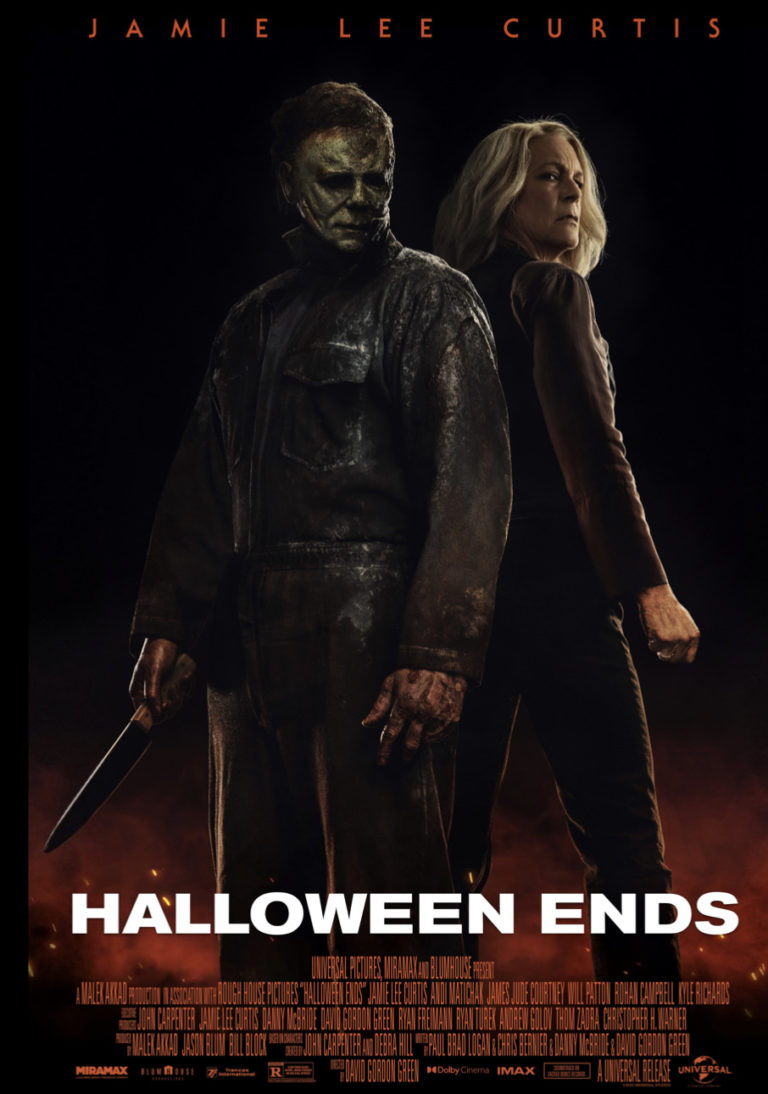
Synopsis : This is Laurie Strode’s last stand. After 45 years, the most acclaimed, revered horror franchise in film history reaches its epic, terrifying conclusion as Laurie Strode faces off for the last time against the embodiment of evil, Michael Myers, in a final confrontation unlike any captured on-screen before. Only one of them will survive.
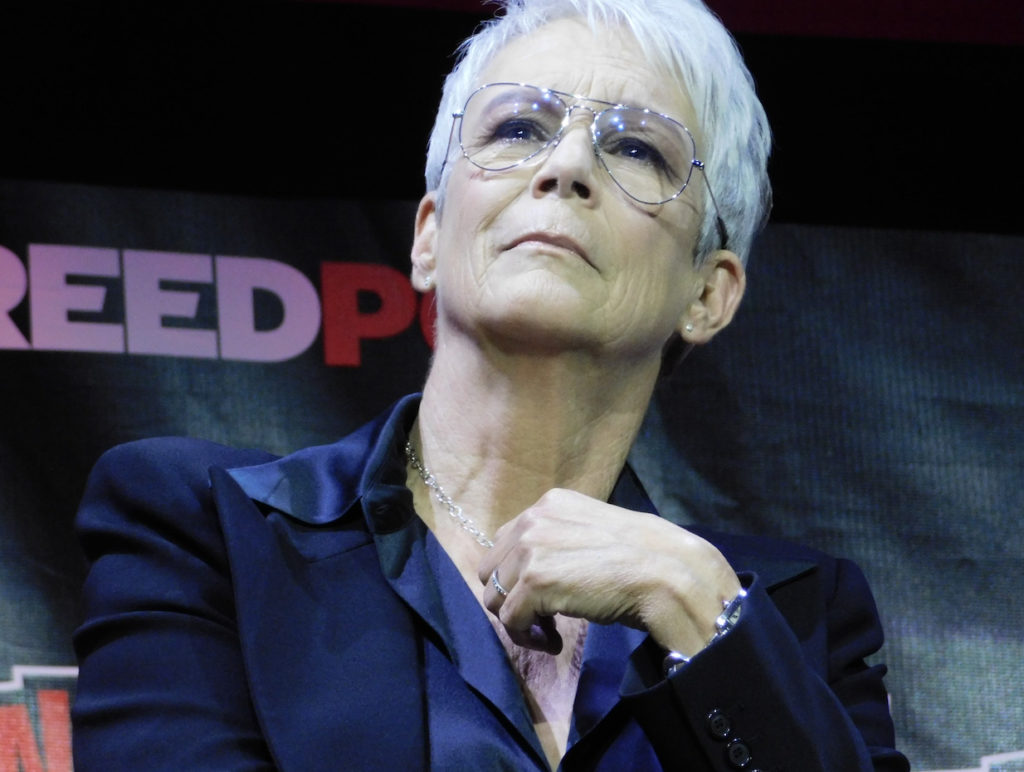
Q: After 44 years, this is the last “Halloween” [movie]. How does it feel?
JLC: You know, endings are a bitch. And so is Laurie Strode. So I’m ready to end it. But I’m going to miss you [fans] so much.
I take it so seriously and I don’t take any of this for granted. You just have to understand this is so overwhelming, and I appreciate your support very, very much. But it’s all overwhelming for me.
Q: The first “Halloween” in 1978 was your first film. There had been some television previously in your CV. But your first film as Laurie Strode was your first film role. You were nineteen at the time. What do you remember most about making that movie, and how you felt about Laurie and yourself intersecting, at the same time?
JLC: When I was nineteen, I was not like Laurie Strode. Laurie Strode was an acting part. You would have hired me to play Linda. I was a little promiscuous . . . I was a little snarky and a little promiscuous, but I was not Laurie Strode. What was amazing to me was it was an acting part. She didn’t look like me, she didn’t dress like me, she didn’t think like me. She was like the valedictorian of her class. I barely got out of high school. There was a real opportunity for me to be an actor, which I hadn’t had that opportunity before. For me, that was incredible. So I loved that opportunity.
Shooting the movie, we shot it in seventeen days. I’ve been on a world tour that’s twice as the entire time we made the movie “Halloween”. I mean, it’s insane! And I guarantee you they spent more than 25 times — maybe 30 times — the amount of money that the movie cost to promote this movie. So it’s sortof surreal.
But here’s my memory — I swear: Steely Dan, “Hey Nineteen” was a hit then, and the crew kindof dedicated it to me which thought was unbelievable. Because the crew were 25 dudes under thirty. And I was nineteen. They [went] “Here’s your song, Jamie.” So that’s my memory. “Hey Nineteen” by Steely Dan was about me.
Q: These are the morsels and memories that we are looking for. Because now I’m not going to listen to “Hey Nineteen” anytime soon and not be thinking about that memory with you. Let me ask you, as someone who has tried to step into shoes of genre and, not just acting and developing a character, but truly running for your life, hyperventilating, screaming and crying. You’re fighting for your life, you’re about to be killed. There’s adrenalin, breathing, crying, terror. What did you do to prepare and sustain that level of acting?
JLC: Well, I’m thinking. All I knew to do — because you shoot a movie out of sequence, which is how you make movies, you don’t shoot them in order. And in a low budget movie, you really don’t shoot them in order. I numbered — I took zero to ten, ten being the most intense part of the movie, which was after she finds her friends and the chase is on. And I numbered the script so that I could know sortof a terror meter of where I was emotionally. The director should be doing that, but John was also busy with a lot of things. But I just wanted to be sure I was in the zone.
I’ve got to tell you something: all this is easy for me. I know that sounds like a really terrible thing to say, because people work hard at their jobs. And I work hard at my job, but it’s not a hard job for me. You guys have harder jobs than I will ever have. Yet I get all the attention. So I don’t understand why. Yet it’s not hard for me — emotion and all that stuff is not hard.
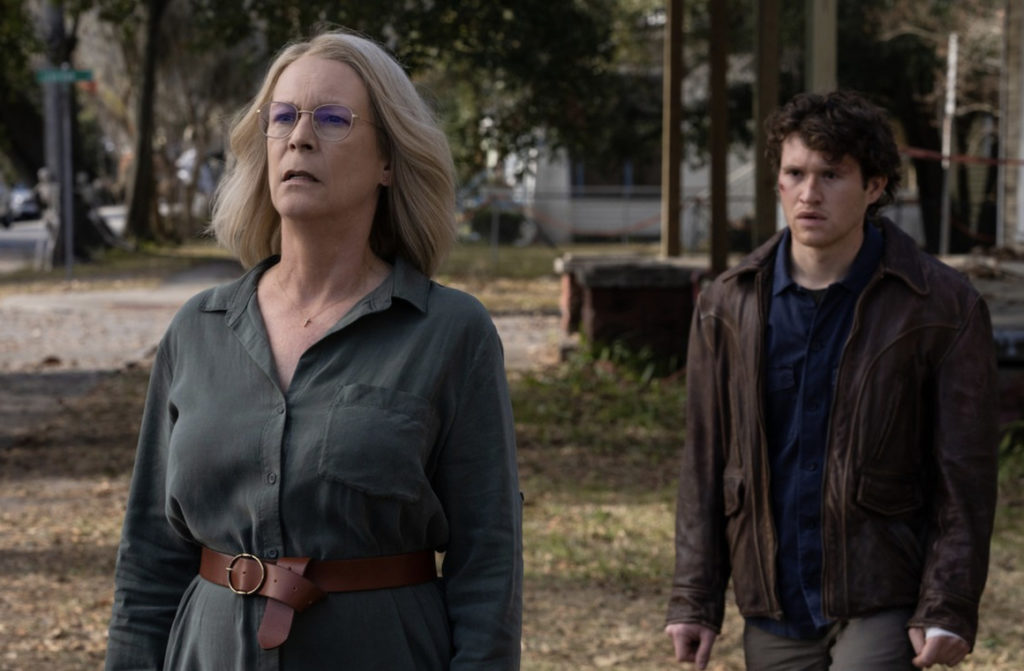
Q: As a filmmaker, producer, director, actress, anyone who wants to go into storytelling in the visual form should remember that list. Because it’s true. You shoot out of sequence, you’ve got to know as the director where your character’s going to be as it’s heightened. And as a performer, you can’t be at a ten the whole time. You’ll drive people away. And if you’re a one the whole time, well, that’s just stupid.
So that is interesting craftmanship, and I’m really glad you shared that with us. That’s a teachable moment for anyone who wants to be in storytelling. So thank you.
You and Laurie have both evolved since the first film, but was there one thing of yourself that you put into Laurie in the first film?
JLC: Well, I wanted her to be believable. I’m vulnerable and innocent and I may have come off as a sophisticate but I wasn’t. I didn’t know shit at nineteen, but I pretended maybe I did. All that John said to me — and you guys will appreciate this, because we’re in a big hall. All John said was “I want her to be vulnerable”.
Now when I was nineteen — first of all, I couldn’t spell “vulnerable”, I barely got out of high school. And two, I thought that meant “weak” for some reason. I thought okay, John. We made the movie.
Then I went into a late-night theater in Hollywood. It was a packed house, it was around Halloween. I stood in the back, and the movie was going on. You know, Laurie and her friends, and teasing, and Michael — all of that. And then the phone call from Linda, and Laurie looking out the window, checking on the kids, and then walking across the street.
Now you guys know the sequence. It’s the first use of Steadicam I’d ever seen, Steadicam was a brand new tool. Ray Stella, who was the cameraman, was doing the POV of Laurie across the street and then pulling me across the street. You’re cutting from Laurie to the house, it’s that long walk. And in a pin-silent theater, a woman in the middle stood up and went: [shouts] “DON’T GO IN THERE!!! THERE’S A KILLER IN THE HOUSE!!!”
And the theater — it was like the moment they were released to go: “Ohh NO!” and the whole theater started the audience participation that we now know is a moment of the experience. It was in that second that I went “Ohhh. That’s what he meant.” He wanted her to be vulnerable so that you cared about her and you didn’t want her to get hurt.
And you guys haven’t wanted me to get hurt for 44 years.
Q: Now you have extraordinary parents: Tony Curtis and Janet Leigh, true movie star icons in their own right. What did they teach you, anything you can think of to share with us about when you decided to get into their industry?
JLC: Not really, it’s not like we talked shop. It’s like, who talks to their parents about their work, really? I remember my mom, early on, I think she understood that I was insecure. I was one of those people where — if we met and I was nineteen, I’d look at you and I’d go home and buy a pink suit and pink glasses, and maybe a big brooch [what Drew was wearing], and try that. Because I didn’t know who I . I think my mom recognized that, and she said to me at one point “Just be yourself.” Somehow she knew that that was what I needed to hear.
Now I didn’t heed her advice, and if you go back on the internet and look back at haircuts and outfits and really bad choices — it was my attempt at something. I finally landed now, 64, this is it. But then I was searching. Which we all do. There’s not a person here in this room that doesn’t play. Who here hasn’t had a bad haircut? [show of hands] Yeah, thank you. So that was my mom.
And my dad? I swear to you guys, and is literally the truth. I didn’t know him very well, I didn’t grow up with him. He said two things to me that pertained to show business, which make me laugh. One thing you’re not really going to understand unless you’re a film student.
We were in a car, we pulled up to a stop light. I was sitting [front seat] and he was driving, and he turned to me and he said “Never let them shoot you with anything less than a fifty.” Lens size. He was trying to explain that anything less than a fifty millimeter lens was going to distort the face. A 35 millimeter lens or a 28 or whatever is going to make you not look so good.
Now I have a face the size of a door wedge. So the truth of the matter is a wider lens actually works because [of this] skinny face. But weirdly enough, for some reason, Tony Curtis felt like he needed to share that with me.
The other thing that was crucial — and it’s advice I’d give to everybody alive who signs their name to something. He said “Remember that whatever you sign, there are two little words in the legal description that says “in perpetuity” — which means “forever”. That what you are about to give them by presenting yourself in whatever it is they’re filming, it’s theirs forever.” Then he said “Use that as something to be reminded about.”
Now I don’t know if any of you have seen the movie “Virus”, but obviously I didn’t heed his advice. There are a couple others that I won’t mention. But “Virus” — that is a movie that lasts forever.
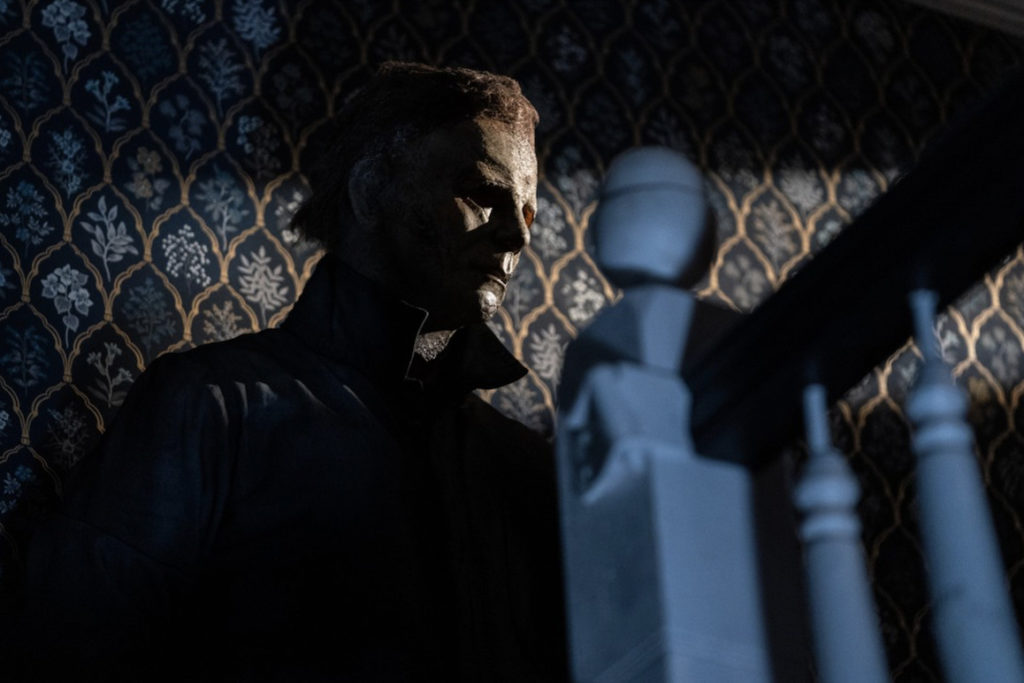
Q: if you had to guess, what would you think people would connect with Laurie about?
JLC: I think Laurie Strode is everybody’s sister, everybody’s friend, everybody’s daughter, granddaughter, niece. She represented pure innocence and kindness. When she comes into conflict — collision, really, with Michael Myers, who is the epitome of evil — in John’s understanding of vulnerability, you care about her. When I say you guys have cared for me, you have carried her — you love her, you have loved her. But I have to know — and I appreciate that — at this point, Jamie and Laurie have become woven together. There is no separation.
I appreciate what you’re saying, I really really do. I don’t have anything in my life without Laurie Strode. Nothing. I would not have a career. I would not have a family. Everything comes from you loving her. I’m telling you.
This should be flipped. It should be me with the lights on you, because I’m telling you, everything good in my life came from that chic little office on Cahuenga Boulevard in Hollywood — that was about the size of where these two chairs are — when John Carpenter and Debra Hill cast me in the part of Laurie Strode. I didn’t know it then. I know it now.
One of these days — hopefully, not tomorrow — I mean, I’m 64, do the math, it’s not in my favor — it’s going to say “Halloween Actress Dies”. My point is, it is the permanent ink of my life, is you guys It’s the permanent saturation into me. No matter what I do, whatever I do, forever. Laurie Strode is because of you. And I thank you. I truly thank God, from the deepest reserve of my being, I thank you
Q: It is poetically synonymous with you. You just wrote your own obit, poetically and synonymous with “Halloween”. And that’s what everyone here is celebrating. You’ve done other horror films, it’s true: “The Fog”, “Terror Train”, “Prom Night” and “Prom Night Dates”?
When you were making all these films, what did you do as an antidote when you were being a scream queen? How did you shake all the intensity of doing that genre of film?
JLC: It doesn’t stick with me. It’s not anything I need to shed or do something to counteract it. It’s just not me. I’m sitting here, with you, at Comic Con, and later I’ll be in my room by myself. I will think back on this, and I will try to explain it maybe to somebody in my family, and they’ll tell me that the dog vomited or something. You know, life is going on around us.
This is a rarefied-air moment for us. But it’s about being here with you right now. I will of course remember it, but I don’t need to separate out anything. I’m a very in-the-moment sort of person. When I’m at work, I’m doing the work.
Q: I have always admired David Gordon Green. “Halloween” 2018 [edition] — “H2O” — is the most successful horror film in the genre’s history. Then you have “Halloween Kills” and now “Halloween Ends”. What do you want people to know about “Halloween Ends”?
JLC: The last thing I ever thought I would do is another “Halloween” movie. I felt like H2O was it twenty years later, I was good. You may or may not know why I was in “Resurrection”. Do you know why?
H2O was conceived by me — really, I’m not titled as a producer. It was me calling John and Debra and saying “Hey, in two years the movie is going to be twenty years old. Nobody has ever made a movie and twenty years later you see the same actor, writer, director, producer. Let’s do it.” That began it. Kevin Williamson wrote the script.
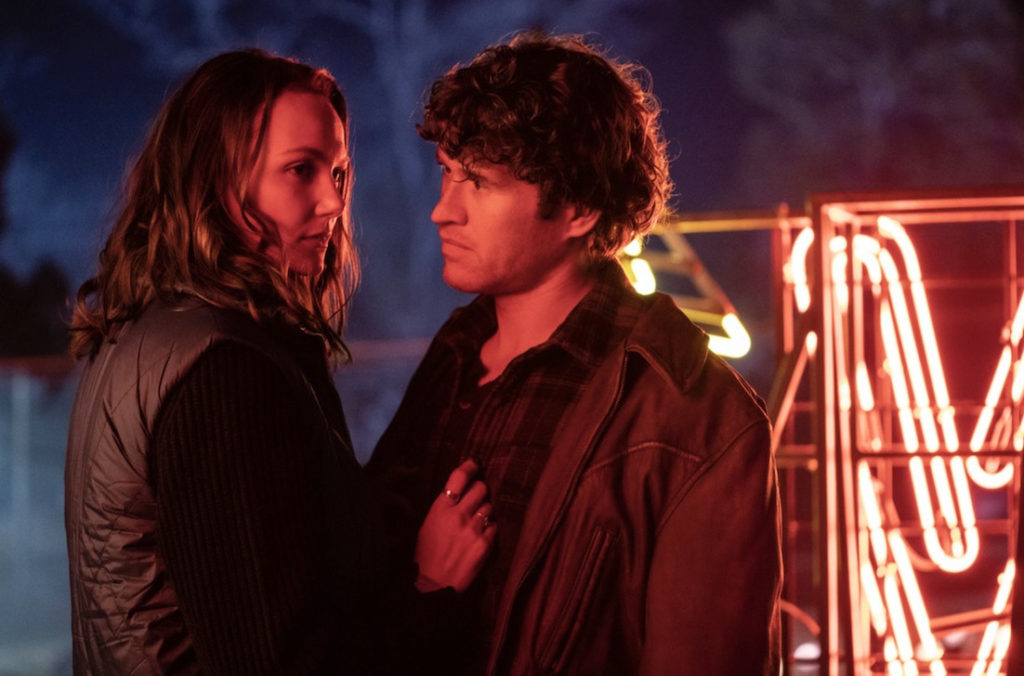
Q: He wrote “Scream”.
JLC: Exactly. So John ultimately didn’t write it, Debra ultimately didn’t produce it. I was in it. It was conceived as, what happens when you run from fear? So the conceit of the movie is that Laurie Strode has run from Haddonfield. She has escaped, she’s changed her name, she’s living with an assumed identity somewhere else, and she feels like she’s safe.
The whole conceit of the movie was: if you’re running from fear, you’re dead inside. You can’t be alive if you’re running from fear all the time. So the conceit of the movie was that there’s this moment where he comes back, and there’s this moment where she has to choose “I’m going to fight him, and die, maybe, but I’m kindof dead already, and if I win, I’m going to be alive.”
That was the conceit of the movie, but it was supposed to end him. Like, End.Him. That’s what we talked about, that’s what I signed up for, and it was all going along great. Then I got the script and it was a vague ending. It was like, whatever, a car going off a cliff, a fire — and it just kept happening over and over. And I went, “Hey, I thought we were ending this.”
It turned out that in that moment there was some contract — I don’t know who it was — and you couldn’t kill him. Now this is a train that’s going, I’m working, I’m ready to go. Kevin came up and I said “I’m not doing it. I’m not going to tease an audience again. I came up with this idea to end it. I’m not going to tease [the fans] and be like, I didn’t really [mean it, just to] get you to come to the movie.
I said “I won’t do the movie. I won’t do it. Laurie Strode has to kill Michael.” What happened was that Kevin Williamson came up with an idea. There was one of those moments of this: “What if . . .?” Between the scene in the house and the body being brought out, it turns out not to be Michael in the thing, it turns out to be a paramedic who’s actually in the mask. So I ultimately kill an innocent person.
I said to them, “Okay, if you’re going to do that, and it looks like Laurie Strode has ended it, my audience is going to feel like it’s ended. Okay, I’ll do it. But you have to pay me a lot of money in the next movie, and you have to kill me in the first ten minutes of the movie because I’ve now killed an innocent man. And I can’t live with that.”
And that’s why the end of H2O is what it is and why I’m in the beginning of “Resurrection”. But I want to address these [points] because I think it’s way more important. Here’s what I think occurred. As I said, I didn’t think I would do another movie. Jake Gyllenhaal, who is my godson, called me and he said “Hey Jame, David Gordon Green — who he had worked with on the movie “Stronger”, about the Boston bombing — wanted to talk to me about a “Halloween” movie.” I was like, “Okay.”
David called me and sent me a script. And what David did is this: Laurie Strode at seventeen survived [Halloween]. Her friends were killed. I believe that Laurie Strode went to school November 2nd, 1978, with a bandaid on her arm, and at that moment nobody said a word to her. There was no therapy, there was go help. Laurie Strode at the age of 17 went back to school and was then the sort of freak — the girl that survived, survivor’s guilt. And nobody ever talked about it.
David Gordon Green sent me a script where he said “I think Laurie’s been spending 40 years living behind barbed wire emotionally, physically, spiritually — and that’s her only purpose in life. At the expense of her daughter and her granddaughter. She knows that Michael Myers is coming back.“ And it was this incredibly beautiful film about Laurie and her trauma.
And I’ve seen the meme, so don’t worry. It was funny. But the movie also made a fortune. You know what I mean. It was this beautiful movie about a woman taking control of her life. And it coincided with the women around the world standing up and taking control of their life and saying “Me too”, “Me Too”, “The time is up”, “Me Too”. Those two things, the wave of the women’s uprising matched the wave of Laurie Strode’s uprising, and together we rode that wave. It was at the moment when you go David Gordon Green was prescient. He wrote this movie two years ago, and now here we are in this moment.
But then it happened again. The second movie, “Halloween Kills”, is about a mob uprising. It’s about a community basically saying to law enforcement, “The system is broken. It’s not working. We’re going to take back the power.” And it coincided with a lot of civil uprisings around the country, mostly based on the George Floyd killing. But it happened all over the country. Groups of people started to stand up, coinciding with the movie and the January 6th insurrection, and then we released the movie called “Halloween Kills” about a mob uprising. Again, David Gordon Green has some prescience, some understanding of society, what we’re doing to each other, of how we are feeling it as a group of people in a community.
And now, he’s made a movie about how we treat each other, and it’s a movie about how the entire town of Haddonfield has turned against Laurie Strode — the very victim, the innocent victim whose life was brutalized by Mike Myers. It shows how pervasive — what violence does to people. And what David Gordon Green has done is slid three little Trojan horses into each of these movies. These movies are about way more than just Michael Myers and Laurie Strode. They’re about who we are.
I’m incredibly proud of them. I’m proud of him, I’m proud of our crew, the writers, and I’m really proud that the audiences want it. You guys have got to don’t want to just see Michael walking around like this [slashes]. You want there to be something of substance because the integrity of these movies is why they’re successful. They’re not successful because we just run around [gestures slashing] and going “Oh, no! Oh, no!” They’re successful because they’re about something, and at the center of all of it is Laurie Strode.
Every single person in this room has persevered. There’s not a person in this room that hasn’t had some hardship, some difficulty, in their lives; that they have continued to stand up and get up each day and say “I’m going to keep trying.” The fact that Laurie Strode has never given up makes me want to sing the Peter Gabriel song. “Don’t Give Up” is the message of Laurie Strode. Don’t give up, people. And I love that that’s her legacy, and it’s her legacy because of you guys.
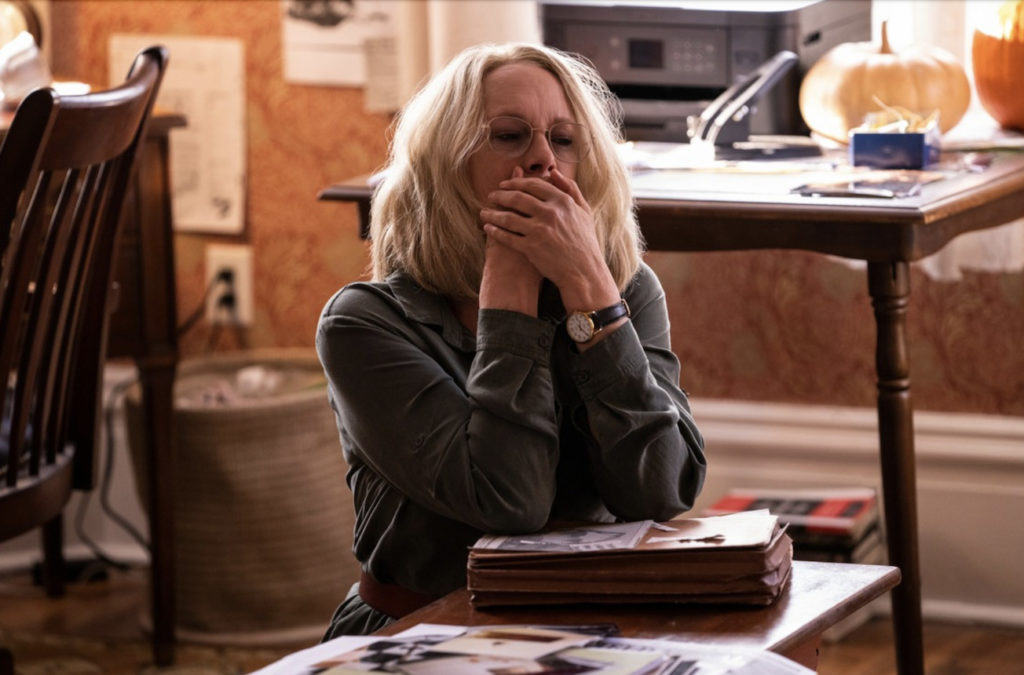
Q: What do you think “Halloween Ends” can do for people as a society?
JLC: We have to have hope. If we don’t have hope, we’re so f$@*ed. There’s a moment in the new movie — there’s a time jump of four years. Four years, Laurie Strode has finally been given the help she needed. She never had anything before. Now Laurie Strode has been given grief therapy, after the opera death of Karen at the end of “Kills”. Laurie Strode has been able to — not heal, but learn to live alongside her grief, it doesn’t consume her. It allows her to exist. And maybe, for a second, you get this idea that maybe Laurie Strode is going to be okay.
There’s a moment she’s in a supermarket. We shot the scene, and I remember in my trailer at lunch, [I’m like] “Why does my jaw hurt? Do I have TMJ or something? Did I grind my teeth?” And I realized it was because I had smiled. I don’t think I had ever seen Laurie Strode smile. Laurie Strode smiled for a second — before the ceiling crashes down on her and the rest of the drama begins.
So I do believe there’s a little hope — doing the work it takes to get there. And what we do to victims, and what we do as a society.
It’s a really interesting movie, and then it gets incredibly intense. I want to acknowledge that what David gave me also was a family. That he gave Laurie a family. A fractured family, a broken family, but a family nonetheless. I would be remiss if I do not acknowledge here on this stage the beautiful layered work of Judy Greer and Andi Matichak. They gave Laurie a grounding in reality. Because we all have families, and they’re complicated. It was another gift from David.
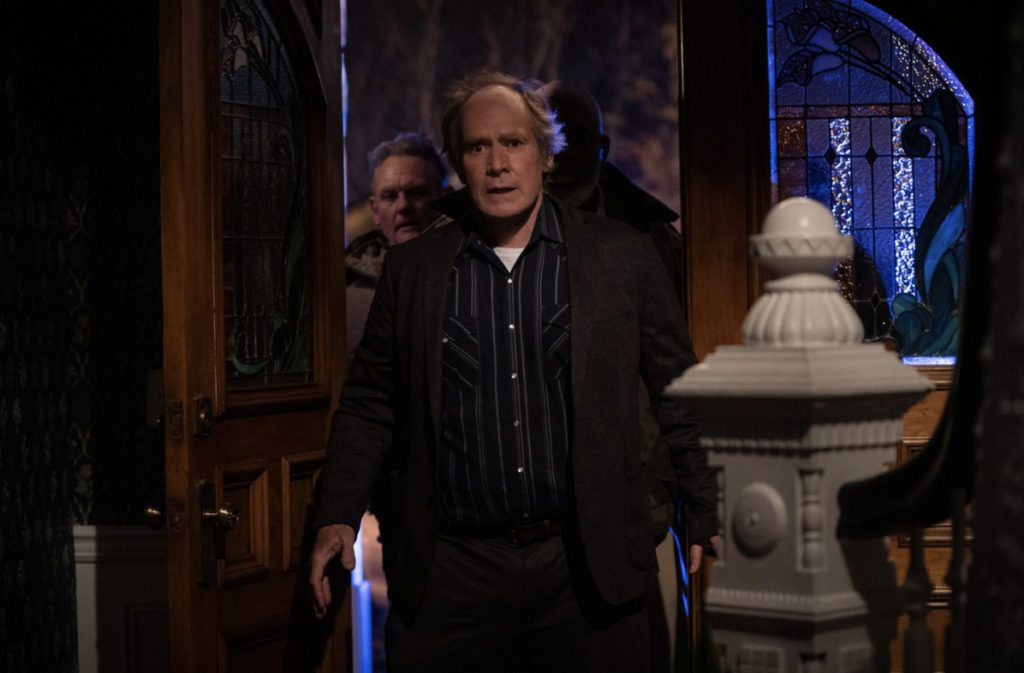
Check out more of Nobuhiro’s articles.
Here’s the trailer of the film.

